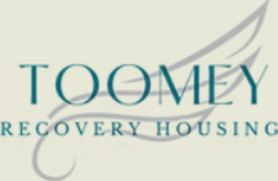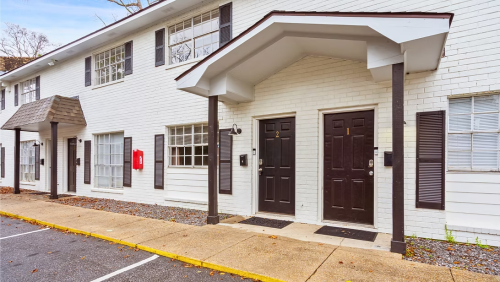
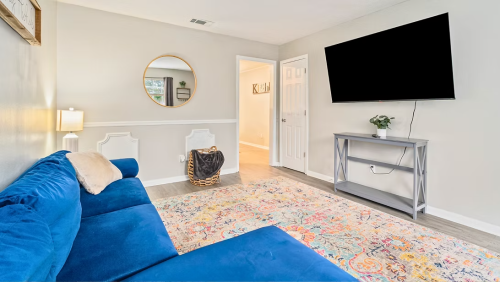
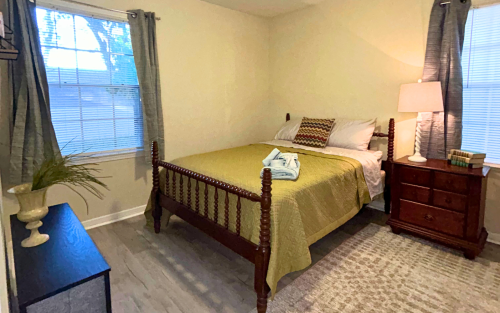



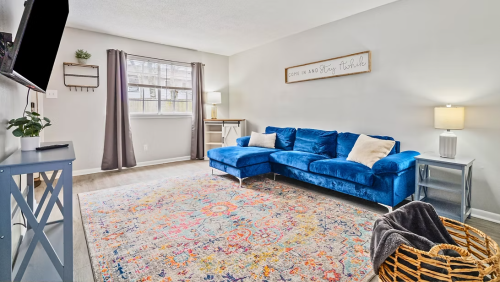
Toomey Recovery Housing
Treatment Focus
This center primarily treats substance use disorders, helping you stabilize, create relapse-prevention plans, and connect to compassionate support.
Primary Level of Care
Transitional housing designed to support individuals recovering from substance use disorders offering a safe, supportive and structured environment for practicing long-term sobriety, while reintegrating back into daily living.
Claimed
Recovery.com has connected directly with this treatment provider to validate the information in their profile.
Treatment Focus
This center primarily treats substance use disorders, helping you stabilize, create relapse-prevention plans, and connect to compassionate support.
Primary Level of Care
Transitional housing designed to support individuals recovering from substance use disorders offering a safe, supportive and structured environment for practicing long-term sobriety, while reintegrating back into daily living.
Private Pay
You pay directly for treatment out of pocket. This approach can offer enhanced privacy and flexibility, without involving insurance. Exact costs vary based on program and length of stay. Contact the center for specific details.
Toomey Recovery Housing
Toomey Recovery Housing
About Toomey Recovery Housing
Toomey Recovery Housing, located in Midtown Mobile, Alabama, provides structured and supportive housing for individuals transitioning from treatment into independent living. Residents stay in fully furnished homes with all utilities, essential household items, and on-site laundry included. This stability allows each person to focus on recovery in a safe and consistent environment.
A Foundation Built from Experience
The program was founded by Justin Toomey, who has maintained sobriety since 2008. His personal experience inspired the creation of a home that offers the structure and accountability often missing after treatment. Alongside co-leader Josh Lansky, who also has lived experience in recovery, they guide residents through a community model built on trust and mutual support.
Building Life Skills for Lasting Recovery
Toomey Recovery Housing emphasizes personal growth through career development, financial literacy, time management, and recovery planning. These programs equip residents with the skills needed for lasting independence. The team focuses on helping individuals regain confidence, stability, and a sense of purpose as they continue their recovery journey.
Pricing Details
Pricing varies from $600–$900 by property (Eldorado vs. Elmira), room type (shared vs. private), and bed size (twin vs. full). All pricing includes utilities, Wi-Fi, furnishings, laundry, and household supplies. Weekly payment options are available.
Center Overview
Treatment Focus
This center primarily treats substance use disorders, helping you stabilize, create relapse-prevention plans, and connect to compassionate support.
Pricing and Program Length
Estimated Center Costs
The cost listed here ($600�–$900/month), is an estimate of program cost. Center price can vary based on program and length of stay. Contact the center for more information. Recovery.com strives for price transparency so you can make an informed decision.
Levels of Care





Your Care Options
Specializations
Drug Addiction
Drug addiction is the excessive and repetitive use of substances, despite harmful consequences to a person's life, health, and relationships.
Alcohol
Using alcohol as a coping mechanism, or drinking excessively throughout the week, signals an alcohol use disorder.
Who We Treat
Men and Women
Men and women attend treatment for addiction in a co-ed setting, going to therapy groups together to share experiences, struggles, and successes.
Approaches
Twelve Step
Incorporating spirituality, community, and responsibility, 12-Step philosophies prioritize the guidance of a Higher Power and a continuation of 12-Step practices.
Evidence-Based
A combination of scientifically rooted therapies and treatments make up evidence-based care, defined by their measured and proven results.
Therapies
Twelve Step Facilitation
12-Step groups offer a framework for addiction recovery. Members commit to a higher power, recognize their issues, and support each other in the healing process.
Life Skills
Teaching life skills like cooking, cleaning, clear communication, and even basic math provides a strong foundation for continued recovery.
Weight Loss
Programming designed to promote sustainable health and wellness through personalized nutrition and fitness plans.
Substances We Treat
Drug Addiction
Drug addiction is the excessive and repetitive use of substances, despite harmful consequences to a person's life, health, and relationships.
Alcohol
Using alcohol as a coping mechanism, or drinking excessively throughout the week, signals an alcohol use disorder.






